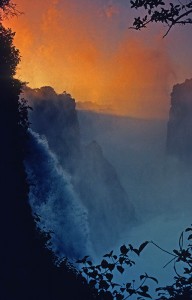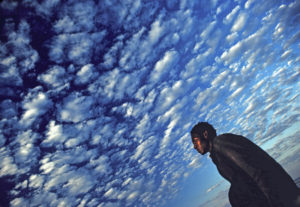
Victoria Falls at dawn — the “Smoke That Thunders.”Photo by Dennis Cox/WorldViews
If you’ve been following the news out of Zimbabwe of late, you know that the country’s long-time president, Robert Mugabe, may finally be nearing the end of his repressive regime.
Mugabe, now age 93, has been placed under mostly house arrest by the country’s military, who have denied that they are engaged in an actual coup — a good public relations move, but probably not very reflective of reality.
The idea seems to be to head off Mugabe’s much younger wife, Grace, from succeeding her husband as head of state. Mugabe’s own political party, ZANU-PF, has withdrawn its support for him, and he now finds himself without any real authority.
Under Mugabe, who came to power in 1980 after leading the resistance to Ian Smith’s white nationalist regime in what was previously Rhodesia, much of Zimbabwe had fallen into chaos and economic collapse, fueled by his corruption and brutality.
When I attended the first day of Zimbabwe’s new parliament some 37 years ago, on assignment for a magazine, hope was in the air. The session, presided over by the delightfully named Canaan Banana, even included Ian Smith and other members of the former government as a peace offering to the minority white population.
Things deteriorated as Mugabe proved to be every bit as repressive as his predecessors, not only discriminating against white farmers by confiscating their lands — which led to widespread famine in a country once called the “Breadbasket of Africa” — but also by purging political opponents and discriminating against other black Zimbabweans beyond his own majority Shona tribe.
For the past few decades, Zimbabwe has been struck by hunger, hyper-inflation — the Zimbabwean dollar climbed as high as 100 trillion to one U.S. dollar — rigged elections (resulting, of course, in Mugabe victories), and human rights abuses.
Tourism Has Survived and Even Thrived
The one ray of sunshine in Zimbabwe’s economy has been tourism.
Along with a number of decent game parks — admittedly depleted by poaching over the years — Zimbabwe shares one of the world’s greatest natural wonders, Victoria Falls, with its neighboring country Zambia. It’s the largest single curtain of cascading water on earth.
Even as Zimbabwe’s countryside has been ravaged and its once-beautiful capital, Harare, has fallen into disrepair, Victoria Falls has emerged as Africa’s adventure sports capital.
While baby boomers may or may not want to try some of the more extreme activities offered — including bungee jumping off the 420-foot Victoria Falls Bridge, the highest commercial jump in the world, or whitewater rafting on class V rapids through the gorges below the falls — there are plenty of other options.
- You can photograph the falls — traditionally known as Mosi-oa-Tunya (“The Smoke That Thunders”) for its roaring waters and rising mists — at dawn or dusk for varying views of light playing on the thunderous cascades. Rainbows often paint the mists in a spectrum of hues.
- You can fly over the falls in a helicopter or light plane for terrific overhead views and photos.
- You can walk a rain forest path across from the falls for more superb views — if you’re prepared to get wet.
- You can take a dinner cruise on the Zambezi River upriver of the falls or ride a scenic train across Victoria Falls Bridge.
- You can canoe and swim on peaceful waters above the falls.
Keep in mind that while various activities are offered on both the Zimbabwean and Zambian sides of the falls, you may have to cross the international boundary (and pay visa fees) to participate in all of them.
In general, the Zimbabwe side offers more vantage points and better panoramas of the falls than the Zambian side, while the latter offers more close-up views, including walkways to the foot of the falls.
The Zimbabwe side also offers more accommodations — including hotels, lodges, guest houses and safari camps — within easy walking distance of the falls. The classic colonial-style Victoria Falls Hotel reigns as queen of area lodgings.

Boatman at Lake Kariba in Zimbabwe. Photo by Dennis Cox/WorldViews
Zambia, on the other hand, has more game parks near Victoria Falls than Zimbabwe, though Zimbabwe has a private park where you can actually walk with lions.
Top national parks for game viewing in Zimbabwe include Hwange, Mana Pools, and Matobo, the latter known for its rhino population.
Huge Lake Kariba — formed by damming part of the Zambezi River between Zimbabwe and Zambia — has been transformed into a “natural” wonder of its own, especially along the shores of Zimbabwe’s Matusadona National Park, where you can view elephants, hippos, and bird life.
My visit there was one of the highlights of all my African travels, along with Victoria Falls.
Practicalities of Visiting Zimbabwe Now
In the long run, certainly, the end of Mugabe’s despotic rule, which seems destined to be soon, can only mean a brighter future for the country.
While it’s possible that civil unrest will follow the downfall of the Mugabe regime, it’s unlikely that the military or any political successors would risk breaking the golden egg of tourism, which, as noted before, has been the one true bright spot in the Zimbabwe economy.
Visits to Victoria Falls are unlikely to be affected, though if you’re concerned you could always opt to stay on the Zambian side and then decide whether or not to venture into Zimbabwe.
The height of the rainy season (March-May) is the time to catch the falls at their most torrential, but the thickness and height of the spray can obscure the views of the falls themselves, and walking on the pathways near the falls can get wet and slippery. The dry season peaks in October and November.
U.S. dollars, euros, and British pounds (along with Indian rupees, South African rands, Australian dollars, Chinese renminbi, and Botswana pulas) are all accepted as currency. The Zimbabwean dollar has been mercifully retired.












3 Responses to Should You Travel to Zimbabwe Now?